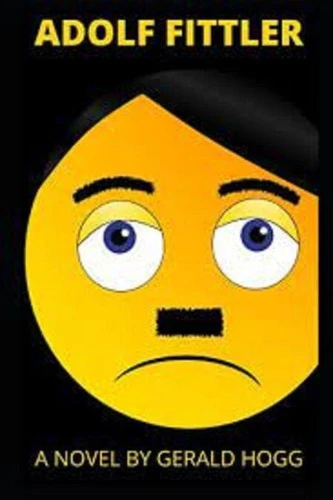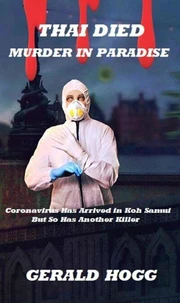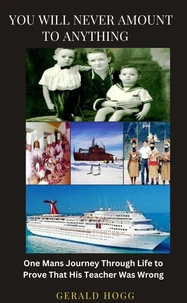Adolf Fittler
Par :Formats :
Disponible dans votre compte client Decitre ou Furet du Nord dès validation de votre commande. Le format ePub est :
- Compatible avec une lecture sur My Vivlio (smartphone, tablette, ordinateur)
- Compatible avec une lecture sur liseuses Vivlio
- Pour les liseuses autres que Vivlio, vous devez utiliser le logiciel Adobe Digital Edition. Non compatible avec la lecture sur les liseuses Kindle, Remarkable et Sony
 , qui est-ce ?
, qui est-ce ?Notre partenaire de plateforme de lecture numérique où vous retrouverez l'ensemble de vos ebooks gratuitement
Pour en savoir plus sur nos ebooks, consultez notre aide en ligne ici
- FormatePub
- ISBN8215567838
- EAN9798215567838
- Date de parution24/04/2024
- Protection num.pas de protection
- Infos supplémentairesepub
- ÉditeurWMG Publishing
Résumé
My dad, John Fittler was a racist as was his father before him. Dad always said, to anyone who would listen, that if he had been born in Alabama or Mississippi in the USA, he would have been in the Klu Klux Klan, burning crosses and lynching niggers. Unfortunately for him, he was born in Middlesbrough in the county of Yorkshire in England. I started my life as a racist; I had little choice, as growing up that was all that my father talked about, every conversation always seemed to revolve around or relate to black or Asian people.
After the Second World War black and ethnic minorities from Commonwealth countries were now starting to arrive in Britain, driving buses, working in the shops, or working on building sites building new housing estates in the town, there were even two Pakistanis working on the docks, though thankfully not alongside my dad as they worked on the opposite shift to him. Some of the immigrants who arrived in the country with some money decided to go into business and opened up shops or restaurants or other businesses.
I had little to do with any immigrants, the ones that were in our school I avoided, as did most of the other white kids in the school and the black and Asian kids tended to stick together as there was safety in numbers. In June 1959 there was a turning point in my life, an event that would transform the way that I would view the world and live my life when Winston and Kaleisha Brown, two kids from Jamaica moved into a council house on Granville Street in the Cannon Street area of town, just two doors down from the Fittler house.
After the Second World War black and ethnic minorities from Commonwealth countries were now starting to arrive in Britain, driving buses, working in the shops, or working on building sites building new housing estates in the town, there were even two Pakistanis working on the docks, though thankfully not alongside my dad as they worked on the opposite shift to him. Some of the immigrants who arrived in the country with some money decided to go into business and opened up shops or restaurants or other businesses.
I had little to do with any immigrants, the ones that were in our school I avoided, as did most of the other white kids in the school and the black and Asian kids tended to stick together as there was safety in numbers. In June 1959 there was a turning point in my life, an event that would transform the way that I would view the world and live my life when Winston and Kaleisha Brown, two kids from Jamaica moved into a council house on Granville Street in the Cannon Street area of town, just two doors down from the Fittler house.
My dad, John Fittler was a racist as was his father before him. Dad always said, to anyone who would listen, that if he had been born in Alabama or Mississippi in the USA, he would have been in the Klu Klux Klan, burning crosses and lynching niggers. Unfortunately for him, he was born in Middlesbrough in the county of Yorkshire in England. I started my life as a racist; I had little choice, as growing up that was all that my father talked about, every conversation always seemed to revolve around or relate to black or Asian people.
After the Second World War black and ethnic minorities from Commonwealth countries were now starting to arrive in Britain, driving buses, working in the shops, or working on building sites building new housing estates in the town, there were even two Pakistanis working on the docks, though thankfully not alongside my dad as they worked on the opposite shift to him. Some of the immigrants who arrived in the country with some money decided to go into business and opened up shops or restaurants or other businesses.
I had little to do with any immigrants, the ones that were in our school I avoided, as did most of the other white kids in the school and the black and Asian kids tended to stick together as there was safety in numbers. In June 1959 there was a turning point in my life, an event that would transform the way that I would view the world and live my life when Winston and Kaleisha Brown, two kids from Jamaica moved into a council house on Granville Street in the Cannon Street area of town, just two doors down from the Fittler house.
After the Second World War black and ethnic minorities from Commonwealth countries were now starting to arrive in Britain, driving buses, working in the shops, or working on building sites building new housing estates in the town, there were even two Pakistanis working on the docks, though thankfully not alongside my dad as they worked on the opposite shift to him. Some of the immigrants who arrived in the country with some money decided to go into business and opened up shops or restaurants or other businesses.
I had little to do with any immigrants, the ones that were in our school I avoided, as did most of the other white kids in the school and the black and Asian kids tended to stick together as there was safety in numbers. In June 1959 there was a turning point in my life, an event that would transform the way that I would view the world and live my life when Winston and Kaleisha Brown, two kids from Jamaica moved into a council house on Granville Street in the Cannon Street area of town, just two doors down from the Fittler house.















